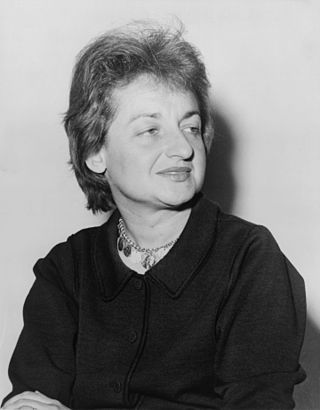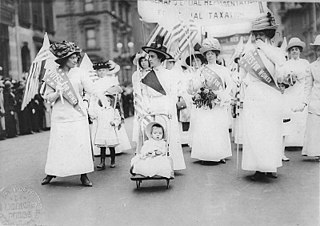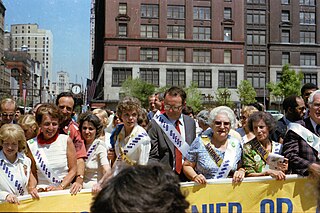Feminism is a range of socio-political movements and ideologies that aim to define and establish the political, economic, personal, and social equality of the sexes. Feminism holds the position that societies prioritize the male point of view and that women are treated unjustly in these societies. Efforts to change this include fighting against gender stereotypes and improving educational, professional, and interpersonal opportunities and outcomes for women.

Betty Friedan was an American feminist writer and activist. A leading figure in the women's movement in the United States, her 1963 book The Feminine Mystique is often credited with sparking the second wave of American feminism in the 20th century. In 1966, Friedan co-founded and was elected the first president of the National Organization for Women (NOW), which aimed to bring women "into the mainstream of American society now [in] fully equal partnership with men".
Liberal feminism, also called mainstream feminism, is a main branch of feminism defined by its focus on achieving gender equality through political and legal reform within the framework of liberal democracy and informed by a human rights perspective. It is often considered culturally progressive and economically center-right to center-left. As the oldest of the "Big Three" schools of feminist thought, liberal feminism has its roots in 19th century first-wave feminism seeking recognition of women as equal citizens, focusing particularly on women's suffrage and access to education, the effort associated with 19th century liberalism and progressivism. Liberal feminism "works within the structure of mainstream society to integrate women into that structure." Liberal feminism places great emphasis on the public world, especially laws, political institutions, education and working life, and considers the denial of equal legal and political rights as the main obstacle to equality. As such liberal feminists have worked to bring women into the political mainstream. Liberal feminism is inclusive and socially progressive, while broadly supporting existing institutions of power in liberal democratic societies, and is associated with centrism and reformism. Liberal feminism tends to be adopted by white middle-class women who do not disagree with the current social structure; Zhang and Rios found that liberal feminism with its focus on equality is viewed as the dominant and "default" form of feminism. Liberal feminism actively supports men's involvement in feminism and both women and men have always been active participants in the movement; progressive men had an important role alongside women in the struggle for equal political rights since the movement was launched in the 19th century.
Equality feminism is a subset of the overall feminism movement and more specifically of the liberal feminist tradition that focuses on the basic similarities between men and women, and whose ultimate goal is the equality of both genders in all domains. This includes economic and political equality, equal access within the workplace, freedom from oppressive gender stereotyping, and an androgynous worldview.
Second-wave feminism was a period of feminist activity that began in the early 1960s and lasted roughly two decades before ushering in a third wave of feminism beginning in the early 1990s. It took place throughout the Western world, and aimed to increase equality for women by building on previous feminist gains in the late 19th and early 20th centuries.
Sex-positive feminism, also known as pro-sex feminism, sex-radical feminism, or sexually liberal feminism, is a feminist movement centering on the idea that sexual freedom is an essential component of women's freedom. They oppose legal or social efforts to control sexual activities between consenting adults, whether they are initiated by the government, other feminists, opponents of feminism, or any other institution. They embrace sexual minority groups, endorsing the value of coalition-building with marginalized groups. Sex-positive feminism is connected with the sex-positive movement. Sex-positive feminism brings together anti-censorship activists, LGBT activists, feminist scholars, producers of pornography and erotica, among others. Sex-positive feminists generally agree that prostitutes themselves should not be criminalized.

The Feminine Mystique is a book by Betty Friedan, widely credited with sparking second-wave feminism in the United States. First published by W. W. Norton on February 19, 1963, The Feminine Mystique became a bestseller, initially selling over a million copies. Friedan used the book to challenge the widely shared belief that "fulfillment as a woman had only one definition for American women after 1949—the housewife-mother."
The Lavender Menace was an informal group of lesbian radical feminists formed to protest the exclusion of lesbians and their issues from the feminist movement at the Second Congress to Unite Women in New York City on May 1, 1970. Members included Karla Jay, Martha Shelley, Rita Mae Brown, Lois Hart, Barbara Love, Ellen Shumsky, Artemis March, Cynthia Funk, Linda Rhodes, Arlene Kushner, Ellen Broidy, and Michela Griffo, and were mostly members of the Gay Liberation Front (GLF) and the National Organization for Women (NOW).
In one scholarly conception, the history of feminism in Poland can be divided into seven periods, beginning with 19th-century first-wave feminism. The first four early periods coincided with the foreign partitions of Poland, which resulted in an eclipse of a sovereign Poland for 123 years.

Veteran Feminists of America (VFA) is a 501(c)(3) charitable organization for supporters and veterans of the second-wave feminist movement. Founded by Jacqueline Ceballos in 1992, Veteran Feminists of America regularly hosts reunions for second-wave feminists and events honoring feminist leaders.

The National Organization for Women (NOW) is an American feminist organization. Founded in 1966, it is legally a 501(c)(4) social welfare organization. The organization consists of 550 chapters in all 50 U.S. states and in Washington, D.C. It is the largest feminist organization in the United States with around 500,000 members. NOW is regarded as one of the main liberal feminist organizations in the US, and primarily lobbies for gender equality within the existing political system. NOW campaigns for constitutional equality, economic justice, reproductive rights, LGBTQIA+ rights and racial justice, and against violence against women.

The Women's Strike for Equality was a strike which took place in the United States on August 26, 1970. It celebrated the 50th anniversary of the passing of the Nineteenth Amendment, which effectively gave American women the right to vote. The rally was sponsored by the National Organization for Women (NOW). Estimates ranged as high as 50,000 women at the protest in New York City and more protested throughout the country. At this time, the gathering was the largest on behalf of women in the United States. The strike, spearheaded by Betty Friedan, self-stated three primary goals: free abortion on demand, equal opportunity in the workforce, and free childcare. The strike also advocated for other second wave feminist goals more generally, such as political rights for women, and social equality in relationships such as marriage.

Feminism is aimed at defining, establishing, and defending a state of equal political, economic, cultural, and social rights for women. It has had a massive influence on American politics. Feminism in the United States is often divided chronologically into first-wave, second-wave, third-wave, and fourth-wave feminism.
In sociology, a superwoman is a Western woman who works hard to manage multiple roles of a worker, a homemaker, a volunteer, a student, or other such time-intensive occupations. The notion of "superwoman" differs from that of "career woman" in that the latter one commonly includes sacrifice of the family life in favor of career, while a superwoman strives to excel in both.
Feminist ethics is an approach to ethics that builds on the belief that traditionally ethical theorizing has undervalued and/or underappreciated women's moral experience, which is largely male-dominated, and it therefore chooses to reimagine ethics through a holistic feminist approach to transform it.
Feminist views on sexuality widely vary. Many feminists, particularly radical feminists, are highly critical of what they see as sexual objectification and sexual exploitation in the media and society. Radical feminists are often opposed to the sex industry, including opposition to prostitution and pornography. Other feminists define themselves as sex-positive feminists and believe that a wide variety of expressions of female sexuality can be empowering to women when they are freely chosen. Some feminists support efforts to reform the sex industry to become less sexist, such as the feminist pornography movement.

The personal is political, also termed The private is political, is a political argument used as a rallying slogan of student movement and second-wave feminism from the late 1960s. In the context of the feminist movement of the 1960s and 1970s, it was a challenge to the nuclear family and family values. The phrase was popularized by the publication of a 1969 essay by feminist Carol Hanisch under the title "The Personal Is Political" in 1970, and has been repeatedly described as a defining characterization of second-wave feminism, radical feminism, women's studies, or feminism in general. It has also been used by some women artists as the underlying philosophy for their art practice.

The feminist movement, also known as the women's movement, refers to a series of social movements and political campaigns for radical and liberal reforms on women's issues created by the inequality between men and women. Such issues are women's liberation, reproductive rights, domestic violence, maternity leave, equal pay, women's suffrage, sexual harassment, and sexual violence. The movement's priorities have expanded since its beginning in the 1800s, and vary among nations and communities. Priorities range from opposition to female genital mutilation in one country, to opposition to the glass ceiling in another.
This is a timeline of feminism in the United States. It contains feminist and antifeminist events. It should contain events within the ideologies and philosophies of feminism and antifeminism. It should, however, not contain material about changes in women's legal rights: for that, see Timeline of women's legal rights in the United States , or, if it concerns the right to vote, to Timeline of women's suffrage in the United States.
The following is a timeline of the history of feminism.








